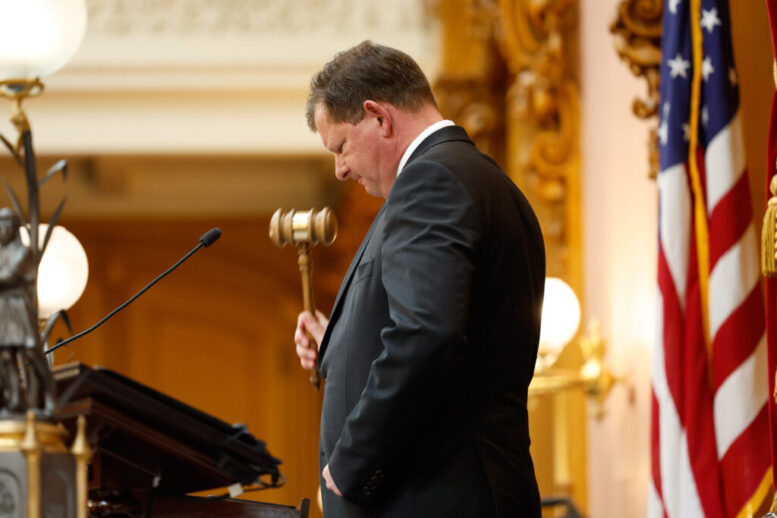Bill banning trans athletes added to bill to limit health care for Ohio LGBTQ youth
A bill that would prevent trans athletes from participating in Ohio women’s sports was woven into a bill that would limit health care for LGBTQ+ youth, and passed the Ohio House Public Health Policy Committee — all in the same meeting.
House Bill 6, dubbed the “Save Women’s Sports Act”, was added to House Bill 68, also known as the Save Adolescents from Experimentation Act (SAFE Act), through a substitute bill that was accepted during Wednesday’s committee meeting. HB 68 now awaits further consideration in the House.
HB 68 would ban doctors from providing gender-affirming care, including puberty blockers and hormone therapy, to trans youth. The bill would prevent physicians from performing gender reassignment surgery on a minor, but many opponents have testified that no Ohio children’s hospital currently performs gender-affirming surgery on those under 18.
“Please trust young people when they tell us who they are. Stop meddling in people’s most private health care decisions, and let trans kids have the opportunity to be themselves. Leave trans kids alone,” said Mallory Golski, the civic engagement and advocacy manager for Kaleidoscope Youth Center.
Christopher Bolling, a member of the Ohio Chapter of the American Academy of Pediatrics, spoke against HB 68 and talked about how he had about 25 patients with persistent gender dysphoria during his more than 30 year career as a pediatrician.
“They are not asking for you to support them, they are not even really asking you to understand them,” he said. “They are asking you to not interfere and insert yourselves into the hardest decisions that they will be facing in their lives.” READ MORE
Ohio House committee talks ‘American Birthright,’ social studies standards
A task force to revise Ohio K-12 social studies standards to be in line with an “American Birthright” model being pushed by a Trump-aligned group would have more time to come up with the standards under an amended Ohio House bill currently being considered by committee.
But that timeline doesn’t allow for enough time, some Democrats on the committee argued in a recent hearing on House Bill 103.
The bill would direct that task force to create K-12 academic standards in social studies, with a specific model mention in the bill, called the “American Birthright.” The model, developed by a Trump-aligned, right-wing group called The Civics Alliance, promotes patriotism and Christian history in America, while seeking to prevent the “subornation of civics education to political recruitment tools,” according to documents on the model.
Bill sponsor state Rep. Don Jones, R-Freeport, listed as an American Birthright policymaker in the model documents, said the Civics Alliance doesn’t provide a specific curriculum along with its model.
The model, and the bill itself, has been criticized by the American Historical Association as unnecessary and focused on the wrong group creating social studies standards. The group said that unlike when the standards are developed by the state agencies and education experts, this model would “hobble” students. READ MORE
Ohio House codifies TikTok ban, bail provisions first offered by Senate
While Ohio House lawmakers decided to press pause on the most contentious proposal up for a floor vote — a bill that would force outing of LGBTQ+ K-12 students — they signed off Wednesday on a proposal codifying court rules for setting bail and another banning TikTok from government devises.
In both cases, lawmakers stepped in to rubber stamp what another branch of government had already done. The first was an approval and extension of that action. In the other, it was because lawmakers blew a hole through a longstanding authority.
Bail fix
The House signed off on a proposal codifying court rules for setting bail. The proposal became necessary because of a cash bail constitutional amendment approved last year.
That amendment overturned a state supreme court decision prohibiting consideration of public safety when setting the cash amount of bail. But the ballot measure — proposed by the general assembly — also took away the court’s ability to set bail procedures through rule.
That change, Rep. D.J. Swearingen, R-Huron, stressed, presents an urgent risk to the broader court system.
“The Ohio Supreme Court has elected, because of the passage of Issue 1 last fall, to allow pretrial detention and release factors to be determined by the General Assembly,” Swearingen explained. “We need to do this before July so that we have those in place for the guidance of our criminal justice system.” READ MORE





